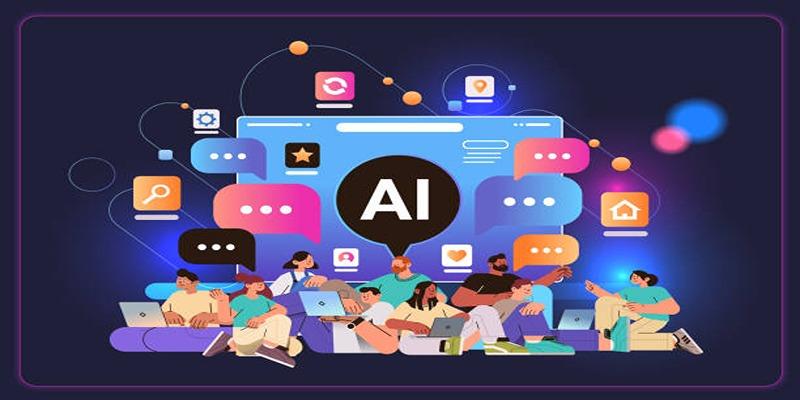Generative AI is transforming modern society by creating new possibilities in technology, art, and communication. However, it also raises ethical challenges, including concerns about privacy, misinformation, and job displacement. Understanding these issues is essential to ensure responsible use of this powerful technology. This document explores these challenges and highlights the importance of balancing innovation with ethical responsibility.
The Rise of Generative AI:
Generative AI refers to algorithms that can create new content—like text, images, audio, and video—by analyzing patterns in existing data. Using advanced machine learning techniques, especially deep learning and neural networks, this technology is transforming industries. It’s opening up exciting possibilities to automate creative tasks, improve productivity, and offer highly personalized user experiences.
But with its rapid adoption comes some tricky ethical challenges. Unlike traditional AI, which is built for specific tasks, generative AI has a much bigger societal impact. Its ability to mimic human creativity and decision-making raises important questions about its effects on jobs, originality, and even our understanding of truth.
Ethical Challenge 1: Bias and Discrimination

Generative AI systems face a major ethical dilemma because bias appears as a persistent problem. Modern generative systems accumulate information from vast data collections which recreate the prejudicial elements found in public social structures. Gender and racial biases in training datasets enable AI systems to double or strengthen such biases in their final outputs.
This problem poses serious ethical concerns because applications with high stakes such as hiring tools and content creation and customer service rely on these systems. AI systems that lack impartiality threaten to maintain existing system discrimination patterns which results in unwarranted mistreatment of vulnerable demographical groups. A solution needs to include three elements: strict data set filtering to reduce bias then ongoing output tracking for issue identification and the development of unbiased fundamental algorithms.
Ethical Challenge 2: Misinformation and Deepfakes
Generative AI has unlocked the ability to produce highly convincing fake content, including text, images, and videos. This has fueled the rise of "deepfakes"—synthetic media designed to deceive viewers by presenting false information as authentic. For example, generative AI could be exploited to craft fake news articles, alter political speeches, or fabricate convincing yet false evidence.
The spread of misinformation through generative AI poses a serious threat to public trust and the integrity of democratic processes. As distinguishing between genuine and fabricated content becomes increasingly challenging, the credibility of reliable information sources is eroded. Addressing this issue demands a multi-pronged strategy, including technological safeguards like watermarking, the establishment of regulatory frameworks, and widespread public awareness campaigns.
Ethical Challenge 3: Intellectual Property and Ownership
Generative AI systems often draw inspiration from existing works—books, art, music—to create new content. This raises intricate questions about intellectual property rights. For instance, if an AI-generated painting mimics the style of a renowned artist, who holds the rights to that creation? Similarly, if a generative AI model produces text influenced by copyrighted material, does this constitute a breach of intellectual property laws?
These dilemmas challenge traditional ideas of creativity and ownership, forcing us to reconsider how intellectual property applies in the age of AI. As generative AI continues to evolve, the need for clear, comprehensive legal guidelines becomes increasingly urgent. Policymakers, creators, and tech companies must collaborate to develop frameworks that safeguard intellectual property while encouraging innovation and creativity.
Ethical Challenge 4: Accountability and Transparency
A significant ethical challenge in generative AI lies in accountability. When these systems generate harmful or unethical content, it’s often unclear who bears responsibility. Is it the developers who designed the AI, the users who deployed it, or the organizations that own and profit from the technology?
Transparency poses another critical concern. Many generative AI systems function as "black boxes," with decision-making processes that are difficult—or even impossible—for humans to comprehend. This opacity makes it challenging to detect and address biases or errors embedded in the system.
To foster trust in generative AI, developers must prioritize explainability. Clear, understandable systems will not only help mitigate risks but also empower users to grasp how these technologies operate and make decisions.
Ethical Challenge 5: The Impact on Employment and Creativity
Generative AI has the power to automate tasks traditionally performed by humans, such as writing, designing, and composing music. While this innovation boosts efficiency and lowers costs, it also sparks concerns about job displacement. Professionals in creative industries may find themselves competing against AI systems capable of producing content in a fraction of the time and at a significantly reduced cost.
Beyond employment, generative AI challenges our perception of creativity itself. If machines can create art, music, and literature, what does it truly mean to be a creative professional? These questions call for a thoughtful, balanced approach—one that embraces the benefits of generative AI while safeguarding the irreplaceable value of human creativity.
Tackling the Ethical Challenges of Generative AI:
Addressing the ethical challenges posed by generative AI requires a united effort. Governments, tech companies, researchers, and civil society must collaborate to create robust ethical guidelines and regulatory frameworks. Key priorities include:
- Fostering Fairness and Inclusion: Ensure AI systems are trained on diverse, representative datasets to minimize biases and promote equitable outcomes.
- Fighting Misinformation: Develop advanced tools and policies to detect and curb the spread of fake or misleading content generated by AI.
- Safeguarding Intellectual Property: Establish clear legal standards to resolve ownership and copyright issues involving AI-generated creations.
- Strengthening Accountability: Enhance transparency and explainability in AI systems to build trust and encourage responsible usage.
- Empowering the Workforce: Provide education, training, and resources to help workers adapt to the transformative shifts AI brings to industries.
The Future of Generative AI:

Generative AI has the potential to revolutionize industries and enhance lives, but its ethical challenges demand careful attention. As we push the boundaries of this transformative technology, it becomes essential to prioritize responsible development and deployment.
To fully realize its promise, we must address critical issues such as bias, misinformation, intellectual property rights, and accountability. By tackling these challenges, generative AI can become a powerful tool for fostering innovation and promoting equity.
The future of generative AI is not solely about technological progress; it’s about crafting a world where technology serves humanity with fairness and integrity. By embedding ethical considerations at its core, we can shape a brighter, more inclusive future for all.
Conclusion:
Generative AI is a powerful yet complex tool, offering immense potential for creativity and efficiency while presenting significant ethical challenges. To harness its benefits responsibly, collaboration and proactive measures are essential. By addressing these challenges head-on, we can ensure generative AI serves the greater good and minimizes potential harm. The path to ethical generative AI may be intricate, but it is a vital and worthwhile endeavor.
